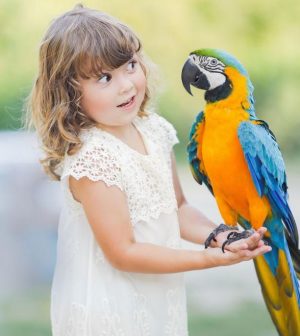- 10 Strategies to Overcome Insomnia
- Could Artificial Sweeteners Be Aging the Brain Faster?
- Techniques for Soothing Your Nervous System
- Does the Water in Your House Smell Funny? Here’s Why
- Can a Daily Dose of Apple Cider Vinegar Actually Aid Weight Loss?
- 6 Health Beverages That Can Actually Spike Your Blood Sugar
- Treatment Options for Social Anxiety Disorder
- Understanding the Connection Between Anxiety and Depression
- How Daily Prunes Can Influence Cholesterol and Inflammation
- When to Take B12 for Better Absorption and Energy
Your Brainy Pet Bird Thrives on Stimulation

WEDNESDAY, Oct. 13, 2021 (HealthDay News) – Committing to a bird is no small decision. And it’s an even bigger commitment if you choose a bird like a parrot or parakeet that’s brainy by nature.
Smarter birds have more needs to stay healthy and happy in captivity, according to researchers at the University of Guelph in Ontario, Canada.
“This study provides the first empirical evidence that intelligent animals can struggle in captivity,” said co-author Dr. Georgia Mason, director of the Campbell Center for the Study of Animal Welfare.
Roughly half of the world’s 100 million parrots now live in homes, zoos and breeding facilities. In the wild, more than 40% of parrot species are threatened or near threatened, said Mason, who has discussed her new study with the World Parrot Trust.
The findings may apply to other brainy captive creatures, including apes, elephants and whales, Mason said.
While certain birds, such as cockatiels, Jandaya parakeets and yellow-naped Amazons typically thrive in domestic settings, relatively large-brained parrots such as Nanday parakeets, monk parakeets and some cockatoos suffer more psychological problems, according to researchers.
“These intelligent species are more invasive, too – another reason to treat them with extra care,” Mason said.
For the study, researchers looked two main data sources. One was a 1990s survey on captive breeding success that included 30,000 birds in the United States.
They also ran an online behavior survey involving almost 1,400 pet parrots representing 50 species. It looked for expected behavior as well as abnormal activity such as biting at cage bars, chewing or even eating feathers, as well as swaying, bouncing or pacing in cages.
Researchers also looked at the birds’ housing conditions and diets and compared the size of their bodies to the size of their brains — a ratio that can be a marker for intelligence. They then teased out inherited traits that predispose species to risk.
They found that species whose natural diet includes nuts, seeds and tough-coated insects were more likely to pluck, chew or even eat their feathers. Parrot species with larger brains were especially at risk of this behavior.
The findings suggest that bird owners need to provide natural diets rather than processed foods. Wild parrots normally spend about 40% to 75% of their time foraging.
Mason said parrots may have an evolutionary need to crunch and manipulate food with their beaks – even when it is processed and presented in a bowl. Or, they may need particular nutrients in natural diets.
“We don’t know which is the most important to feather-plucking birds. So ideally owners should provide naturalistic food items intact so that parrots really have to break their way in and do extractive foraging as they do in the wild,” Mason said.
She also suggested owners provide more mental stimulation to birds. This could include naturalistic aviaries as well as puzzles and other enrichment items. Most parrots are highly social but are often housed alone and sometimes in monotonous and predictable conditions.
“Good parrot carers are doing this already. But if you’re new to parrots, pick a species likely to thrive. Don’t pick parrots that are not a good fit for your place and lifestyle,” Mason said.
The findings were published Oct. 6 in Proceedings of the Royal Society B.
More information
The World Parrot Trust has more about parrots.
SOURCE: University of Guelph, news release, Oct. 5, 2021
Source: HealthDay
Copyright © 2026 HealthDay. All rights reserved.










